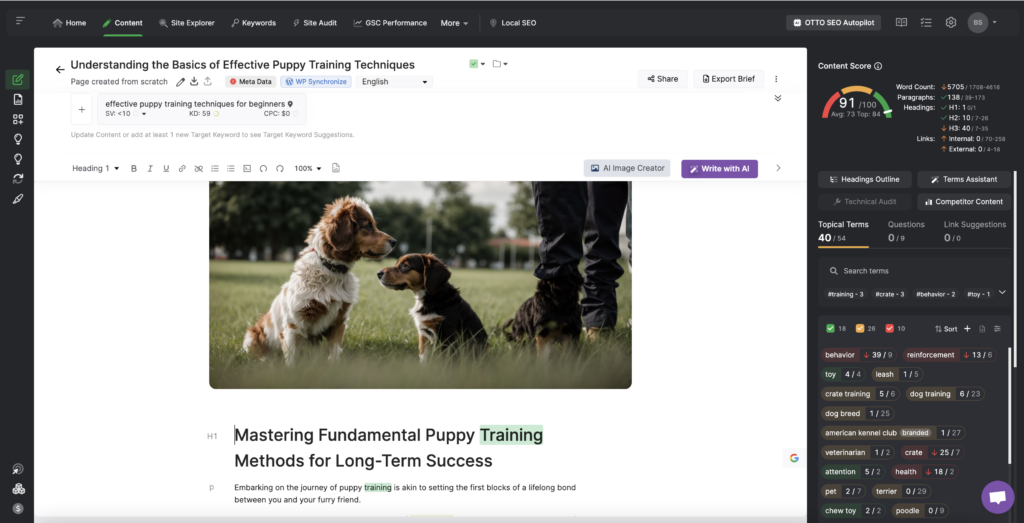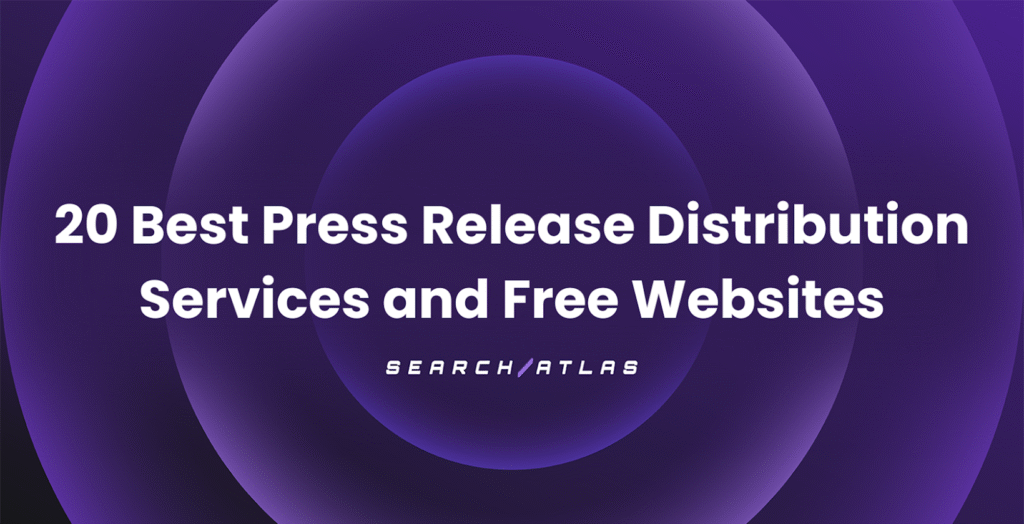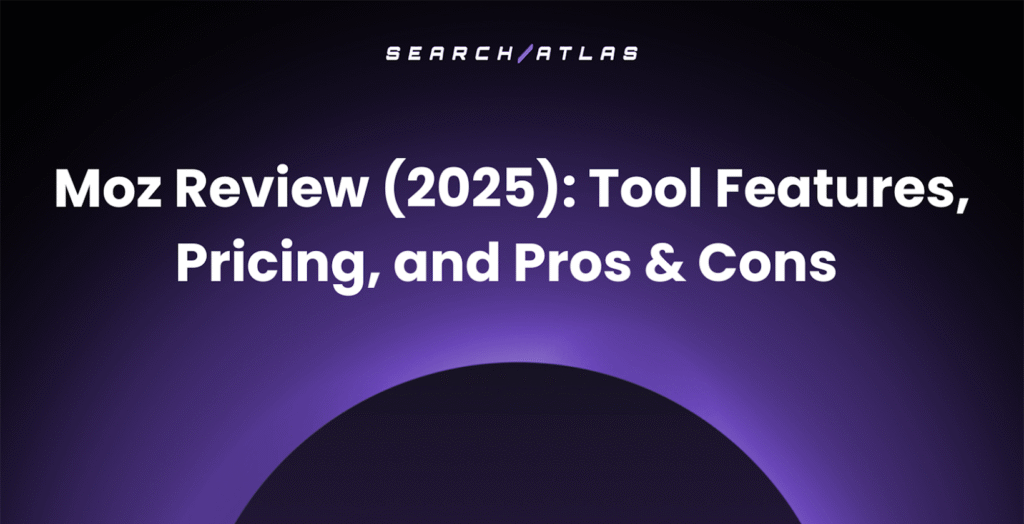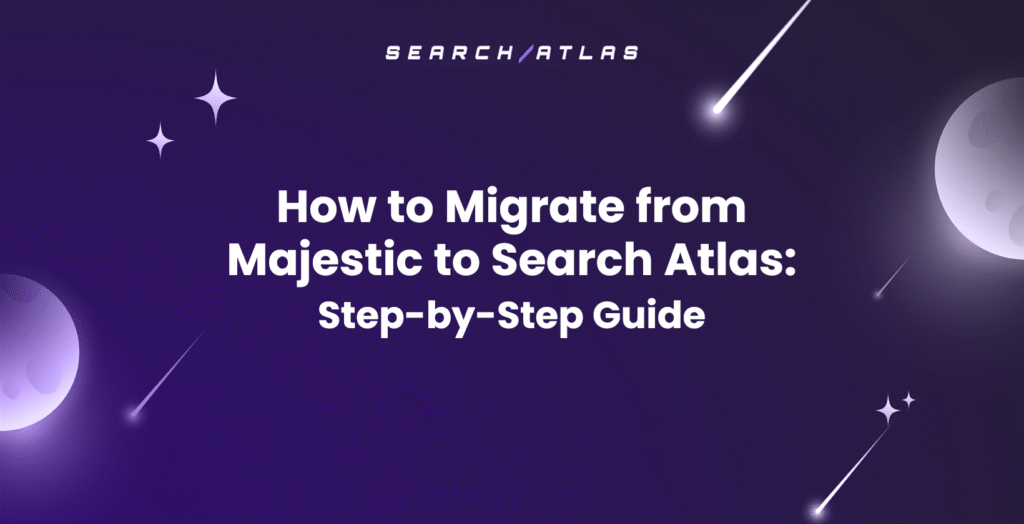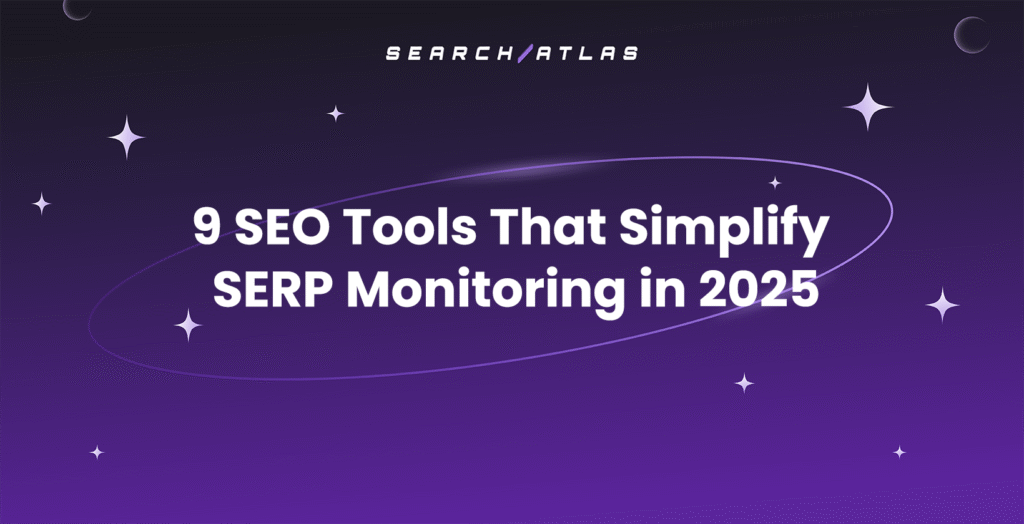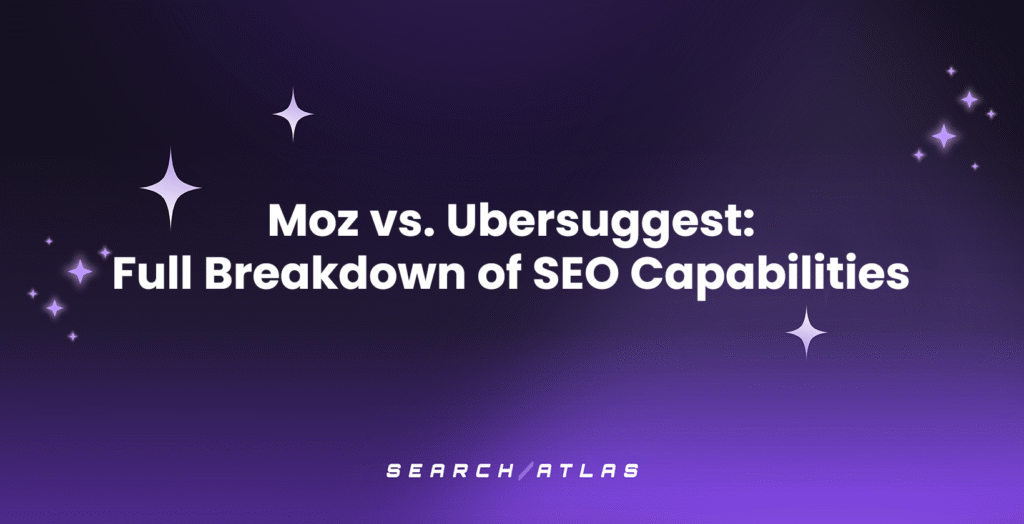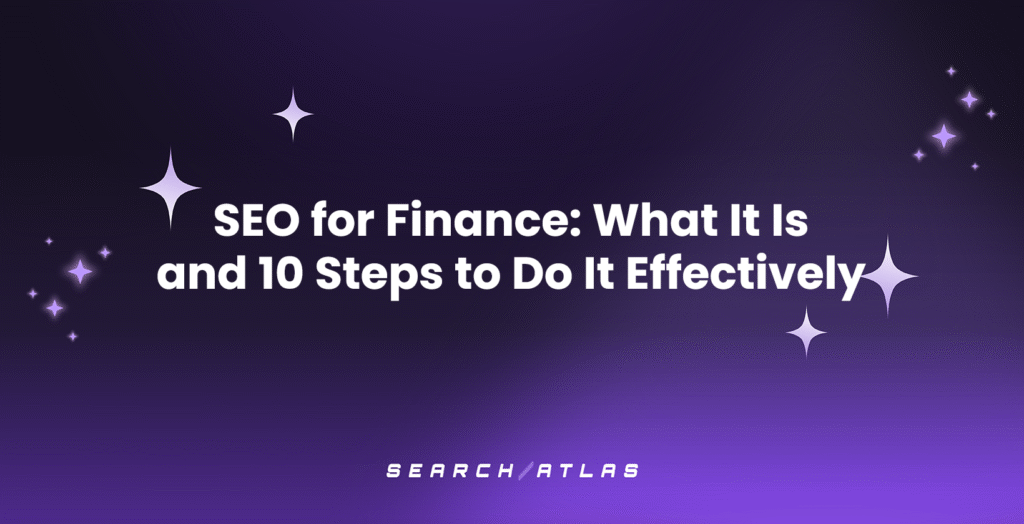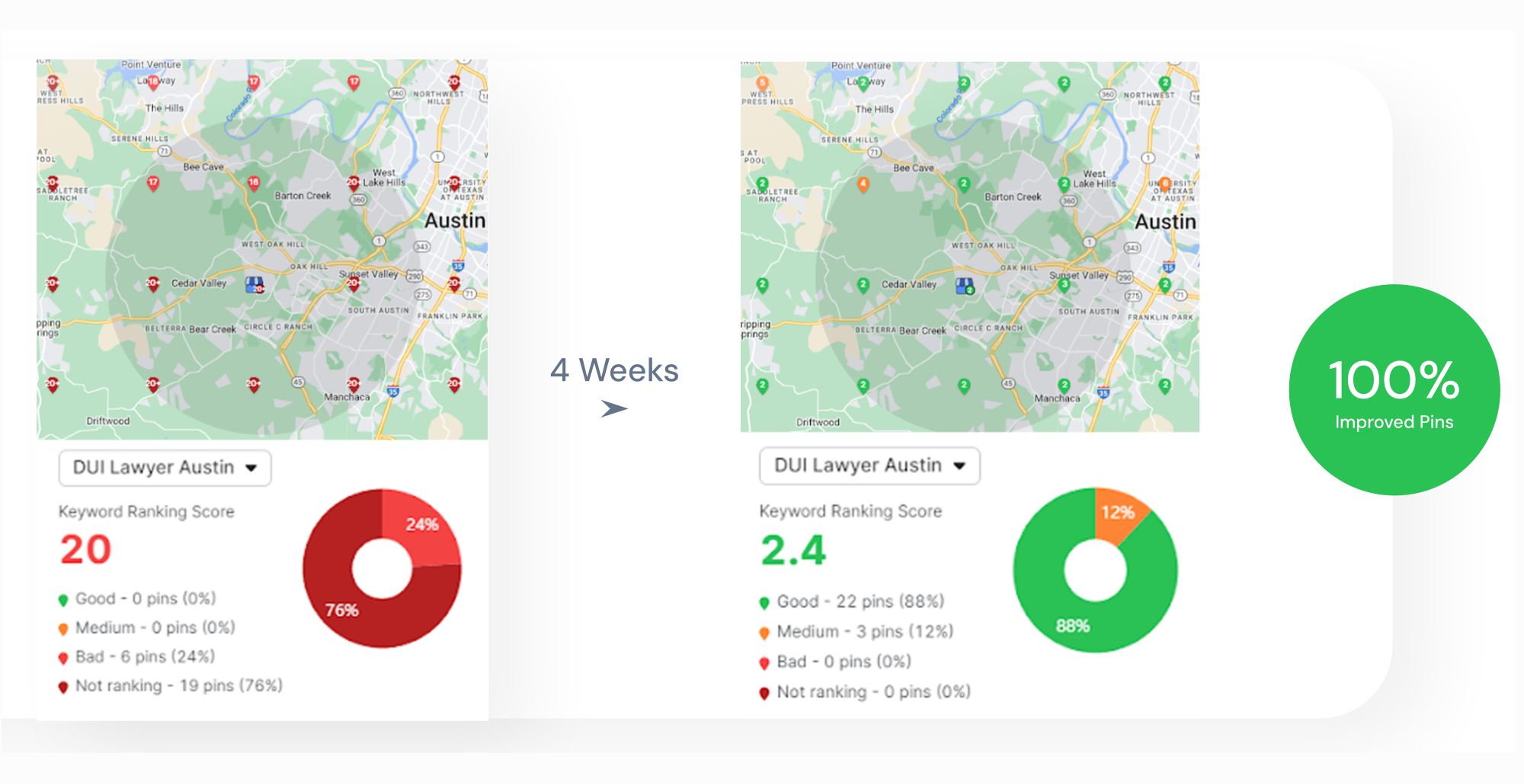Picking between Ahrefs and Moz for your SEO game? It’s a tough call!
With rankings getting harder to win, it’s essential to find the right tool for backlink analysis, site audits, keyword research, and, of course, competitor spying 🔭
Ahrefs vs. Moz is a hot debate among marketers, and while both pack a punch, they have some key differences.
In this guide, we’ll break down their best features, where they fall short, pricing, and more, so you can figure out which one fits your needs best.

What is Ahrefs?
Ahrefs is a renowned SEO platform built for digging deep into keyword research, backlink analysis, and competitor insights. Marketers turn to it for its massive keyword database, solid broken link detection, and generous rank-tracking capabilities.
It’s designed to make complex data easy to navigate, and most SEOs would say it does this pretty well.
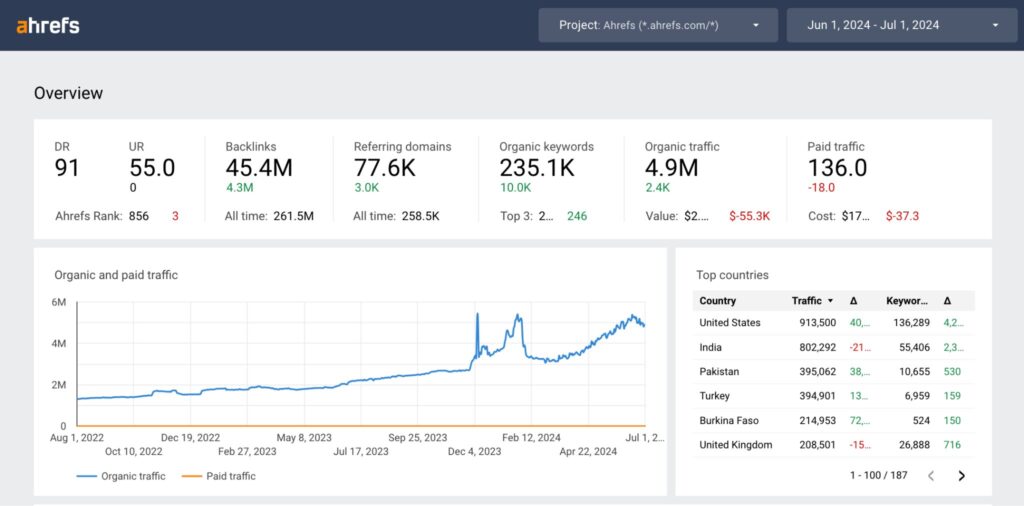
Recently, the platform also improved its AI capabilities, including better keyword suggestions, smarter content recommendations, and enhanced search intent analysis.
Ahrefs Features
Ahrefs is a major-league SaaS company with one of the most comprehensive toolsets on the market. Some of its main tools include:
- Site Explorer: Analyze competitors’ backlinks, top-performing content, and website traffic sources.
- Keywords Explorer: Find popular search terms and analyze keyword metrics like search volume, difficulty, and CPC.
- Rank Tracker: Track your site’s search rankings over time, helping you measure progress and performance
- Web Explorer: Search all pages and links indexed by Ahrefs’ search engine to explore new backlink opportunities and analyze website structure.
- Site Audit: Assess and improve your website’s technical health by scanning for issues like broken links, slow load times, and SEO opportunities.
- Web Analytics: Understand your website’s traffic and user behavior, providing insights into how visitors interact with your site.
- Content Explorer: Discover trending content and link-building opportunities by searching for top-performing articles.
- AI Content Helper: Enhance content quality with AI Content Grader and get suggestions from AI Content Helper.
Ahrefs Pricing
Ahrefs gives website owners a free account with limited features, which is great for hobbyists. If you need more features and the ability to track more keywords, you can explore the paid plans. Each new tier lets you use more tools, filters, and integrations.
- Free (AWT): $0 – 5000 crawl credits and a few basic tools for monitoring your site health, backlinks, and keywords.
- Starter: $29/month – 5,000 crawl credits and access to Site Explorer, Keywords Explorer, and Site Audit.
- Lite: $129/month – 5 projects, 6 months of historical data, 750 tracked keywords, 100,000 crawl credits, and more.
- Standard: $249/month – 20 projects, 2 years of historical data, 2,000 tracked keywords, 500,000 crawl credits, and more.
- Advanced: $449/month – 50 projects, 5 years of historical data, 5,000 tracked keywords, 1,500,000 crawl credits, and more.
- Enterprise: $1,499 /month – Advanced features and additional tools, API access, unlimited historical data, and more perks.
What is Moz?
Like Ahrefs, Moz Pro is a well-known name in the SEO industry. This platform helps users improve search rankings through its keyword research, site audits, backlink analysis, and rank tracking tools.

What sets it apart is its extensive link database and its ability to track site health and competitor performance. Some of its features also let users perform rank tracking and audits without using up project slots, which can be highly valuable to agencies.
Finally, although the updates took some time, Moz has recently added updates such as AI-powered insights, a redesigned interface, and better ranking analytics.
Moz Features
Here we will list the main features available with Moz Pro. As you can see, there is a lot of overlap with Ahrefs, but some features, like the Spam Score, bring additional value to the offer.
- Keyword Explorer: Identify the most relevant keywords to target based on search volume, competition, and intent data.
- Site Audit: Analyze your site’s technical SEO issues like broken links, slow pages, and mobile optimization.
- Backlink Analysis: Assess your backlink profile to identify toxic links and discover valuable opportunities for quality backlinks.
- Rank Tracking: Monitor and track your keyword rankings over time to assess SEO performance and competitors’ strategies.
- Spam Score: Evaluate the spam risk of a domain by analyzing the quality and trustworthiness of its backlinks.
- Link Intersect: Find websites that link to competitors but not to your site, uncovering potential backlink opportunities.
- On-Page Optimization: Review on-page SEO factors like title tags, meta descriptions, and content structure for ranking improvement.
- Custom Reports: Create detailed, customizable SEO reports to track performance, share insights, and make data-driven decisions.
Moz Pricing
Moz has a 30-day free trial that lets you try out its tools and decide whether it works for you. All plans have 24-hour online support, and each tier brings you additional features and higher quotas.
- Starter: $49/month – 1 user, 1 tracked site, 50 keywords/month, 20K pages crawled/month, keyword research, competitive research, MozBar Premium, site tracking.
- Standard: $99/month – 1 user, 3 tracked sites, 300 tracked keywords per month, 400K pages crawled per month, keyword research, competitive research, backlink analysis, unlimited scheduled reports, MozBar Premium, site tracking.
- Medium: $179/month – 2 users, 10 tracked sites, 1,500 tracked keywords per month, and 2 million pages crawled per month. Also, you get increased quotas on SEO tools, branded reports, and report templates together with standard tools.
- Large: $299/month – 3 users, 25 tracked sites, 3,000 keywords/month, 5M pages crawled/month, all Medium features, and further increased quotas on SEO tools.
Ahrefs vs. Moz: Comparing Product Features
Now let’s compare how these platforms serve SEO needs with features like backlink analysis, keyword research, and site audits.
1. Domain Analysis

Ahrefs offers detailed domain analysis, including traffic estimates and the ability to track performance over time. You can see how changes in Google’s algorithm have impacted a domain’s traffic and view its traffic value—essentially the cost of ads delivering an equivalent number of clicks
Ahrefs also provides insights into paid search data, including keyword bidding trends and traffic generated through ads, giving a fuller picture of a domain’s reach and performance.
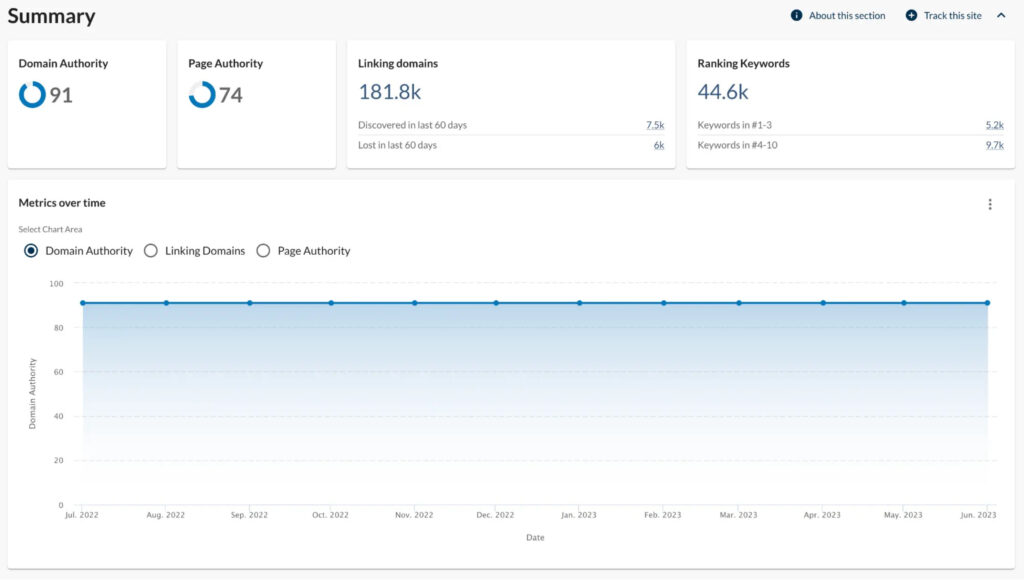
Moz’s Domain Overview has a slightly different approach to domain analysis, although the basics remain similar to Ahrefs. One special difference is the Domain Search Theme, which analyzes the overarching purpose of a website based on its keywords.
Other key metrics include Brand Authority, Domain Authority, and Page Authority, all developed by Moz and used widely in the industry. This is more than enough for many SEOs, however, Ahrefs does have a more comprehensive domain analysis tool.
Winner: Ahrefs
Ahrefs wins this round. It shows how algorithm changes affect performance and provides traffic value data—none of which are available in Moz. Plus, Ahrefs includes paid search data, giving users a clearer view of a domain’s overall reach.
2. Keyword Research
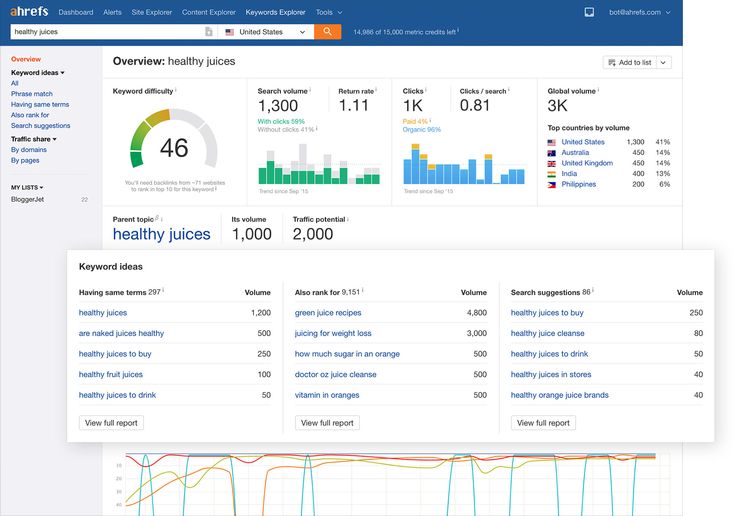
Ahrefs’ keyword research tool, Keywords Explorer, is known for its vast database of keywords. It provides detailed data, including search volume, difficulty, traffic potential, and search intent. You can easily explore keyword variations, group them into topic clusters, and prioritize keywords for your SEO strategy.
The keyword difficulty score is supported by an estimate of the number of referring domains needed to rank in the top 10. Ahrefs offers a deeper, more data-rich experience for keyword research.
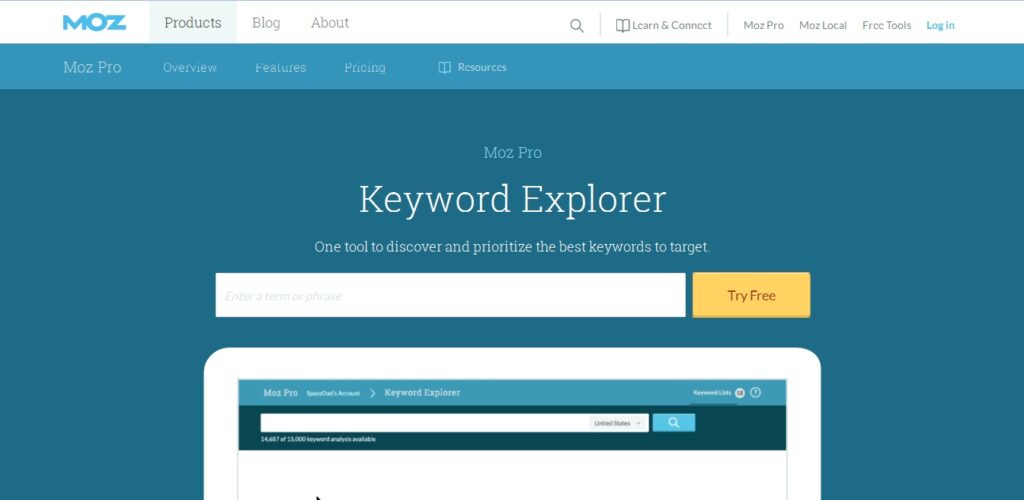
Moz’s Keyword Explorer is similar, but not as detailed. It provides keyword insights with essential metrics like search volume, keyword difficulty, and competition. While its database is smaller at 1.25 billion keywords, it still offers useful features like related keyword suggestions and SERP analysis.
Moz’s keyword data is more basic compared to Ahrefs, with fewer filters and less supporting data. It’s a solid tool for smaller projects, though it doesn’t offer the same depth as Ahrefs.
Winner: Ahrefs
Ahrefs offers more comprehensive data, including keyword variations, traffic potential, and search intent. With its advanced filters, topic clusters, and the ability to evaluate keyword difficulty with domain authority estimates, it’s a much more complete and practical toolset for SEO professionals.
3. Backlink Analysis
Backlinks are an essential SEO ranking factor, so any tool you use should have a solid backlink analysis tool.
Ahrefs’ Backlink Checker offers detailed metrics like Domain Rating (DR), Ahrefs Rank (AR), and the number of backlinks to assess your site’s authority. The Backlink Growth tracker shows trends in backlinks over time. Organic Traffic Insights estimates traffic from linking pages.
Ahrefs identifies Referring Domains, Top Linked Pages, and analyzes Outbound Links, providing a complete view of your backlink profile.
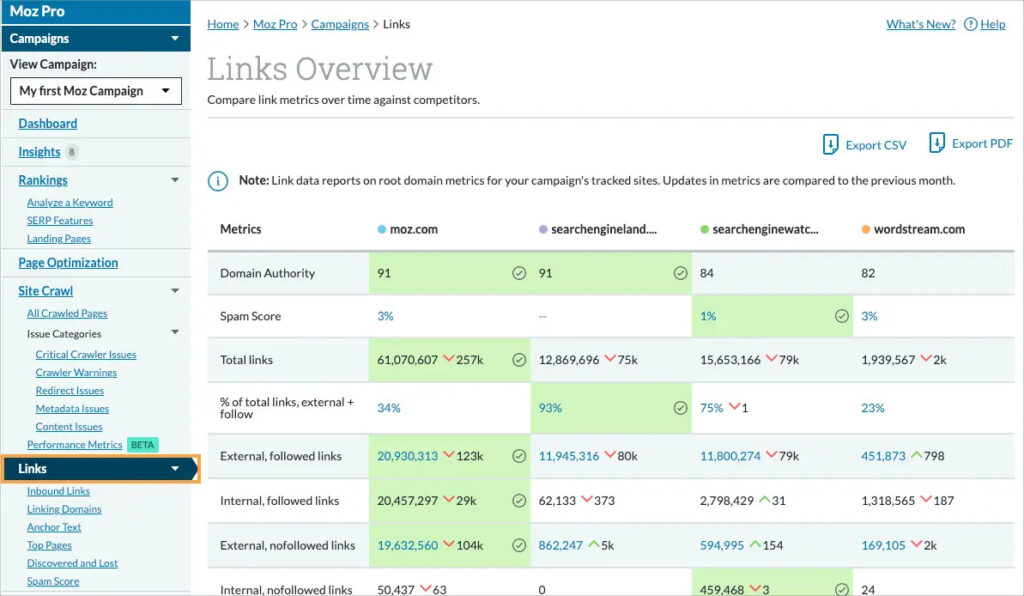
Moz’s Link Explorer provides key backlink metrics such as number of backlinks, referring domains, and anchor text distribution. The Spam Score helps assess link quality by identifying potentially toxic backlinks.
The Link Intersect tool shows sites linking to competitors but not you, offering link-building opportunities. The Top Pages feature identifies your most linked-to pages, and Moz tracks lost and newly discovered links to monitor changes in your profile over time.
Winner: Tied
Both Moz and Ahrefs have massive, reliable link indices, although Moz offers a larger database. On the other hand, Ahrefs has detailed backlink reports, organic traffic insights, and referring domains offering a more in-depth analysis.
4. Competitor Analysis Tools
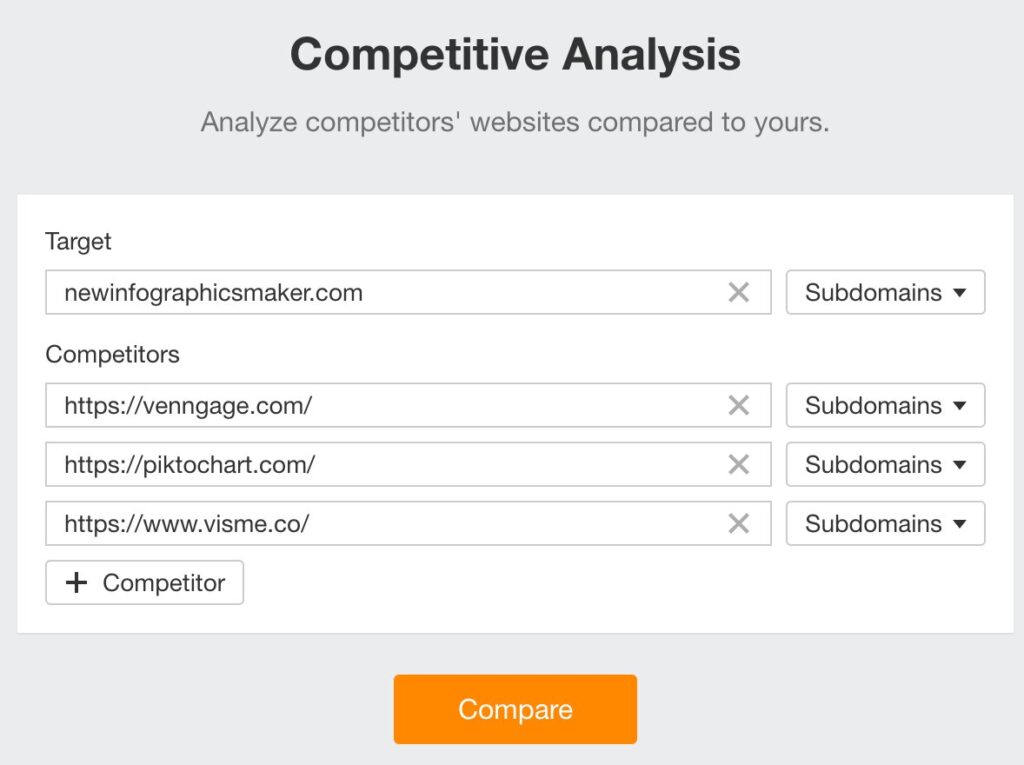
Ahrefs excels in competitor research through its Site Explorer, which reveals a competitor’s organic traffic, top-performing pages, and ranking keywords.
It allows you to see backlinks, identify content opportunities, and gain insights into the competition’s strategies.
This comprehensive analysis, paired with historical data, helps you understand your competitors’ SEO strengths and weaknesses in a detailed way, providing a strong foundation for your own strategy.
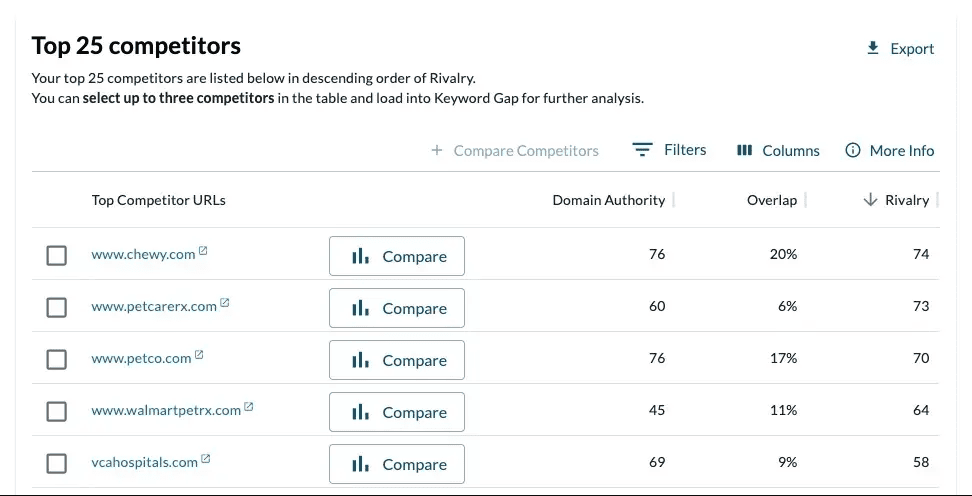
Moz’s True Competitor tool helps you identify and analyze your true organic search competitors. When you enter your domain, the tool evaluates your site’s keywords and rankings to determine which websites are competing with you in search results.
While this tool lets you see data for the top 25 competitors, you can also use Moz’s Keyword Gap Overview tool to find new ranking opportunities. Its metric Traffic Lift sounds similar to Traffic Potential on Ahrefs, but it calculates a different metric.
Moz’s Traffic Lift shows how much more traffic you could get by ranking higher for certain keywords. Ahrefs’ Traffic Potential estimates the total traffic a page could get if it ranked #1, based on all the keywords it appears for.
Winner: Ahrefs
Ahrefs leads in competitor research with its ability to identify competitors, track their organic keywords, and analyze their backlink profiles in-depth.
Moz offers helpful insights with page scores, but it doesn’t provide the same level of comprehensive data as Ahrefs. Ahrefs’ broader database and detailed competitor analysis can help you make more informed, strategic decisions.
5. Pricing
Ahrefs offers a range of pricing tiers starting from the free plan with limited features. While many users already considered it pricey, recent changes have made it even less affordable for some smaller agencies. Also, unlike Moz, Ahrefs doesn’t have a free trial.
Moz’s pricing starts at $49/month for the Starter plan, which includes basic tools and features for a single user. Agencies will usually need its higher-tier plans, but these are also on the costlier side. Also, you pay for additional keywords if you use up your quota, which can get expensive quickly.
Winner: No clear winner
Ahrefs provides more advanced features in its lower-tier plans, whereas Moz has more affordable entry options but may be limited in advanced analysis and larger-scale management.
However, there are more innovative platforms out there that are more cost-effective, and they’re created specifically for agencies.
More Innovation, Fewer Limitations: Search Atlas
Search Atlas is one of the fastest growing SEO tools on the market, thanks to its time-saving AI features and a complete SEO toolkit that also includes off-page and outreach features.
The best thing about the tool is that it’s constantly evolving and adding new features, as it aims to be the only tool any agency needs.
Search Atlas Features

Search Atlas is unique in its scope. It covers all your SEO needs, including:
- Site Audit Tools: Complete reports on all technical, content, or page performance issues, along with site health metrics and how-to-fix guides. Automated issue notifications, 24/7.
- Local SEO Tools: Local heatmaps, local SEO reports, citation building, and automated GBP management.
- On-Page Tools: Analyze your site’s technical, content, and keyword optimization against your competitors. Improvement feedback included.
- Off-Page Tools: Manage link building directly from the dashboard with email templates and filtering options for outreach, as well as press release syndication.
- Reporting: Build custom reports for your clients.
- Content: This includes content optimization tools, as well as content creation and planning.
- Automation: Automated SEO tools can save you time on almost any task, including instant SEO fixes, one-click publishing, on-page SEO, content recommendations, and more.
- Competitor Research: This includes 8 backlink analysis tools, as well as link gap analysis, keyword gap analysis, and Site Explorer.
Other features include PPC tools, as well as an AI SEO Assistant, OTTO. There are over 40 tools available, which makes Search Atlas one of the most feature-rich SEO toolkits on the market.
Domain Analysis

Search Atlas’ Site Explorer lets you analyze any domain for organic traffic, backlinks, keywords, and page performance. It does so in great detail, giving you filters such as search intent, search volume, cost-per-click, and keyword difficulty data.
You can also track any domain’s historical performance, rankings, and ad spend.
Keyword Research Tools
Search Atlas has four keyword research tools, including Keyword Researcher, Keyword Magic Tool, Keyword Gap Analysis, and Content Planner.

These tools let you complete all keyword research tasks from beginning to end. This includes browsing thousands of related keywords, variations, and questions, creating keyword lists and reports, and creating your content plan automatically from one seed keyword.
You can also analyze your competitors’ keywords and discover content opportunities that let you rank more easily. The keyword data can be segmented regionally and locally, and stacked against your competitors in the SERP overview panel.
Competitor Research Tools
Search Atlas packs a punch when it comes to competitor research, helping you take your SEO strategy to the next level. The Competitor Keyword and Content Research tool shows you exactly which keywords and pages bring in the most traffic for your competitors—so you can find opportunities to outrank them.
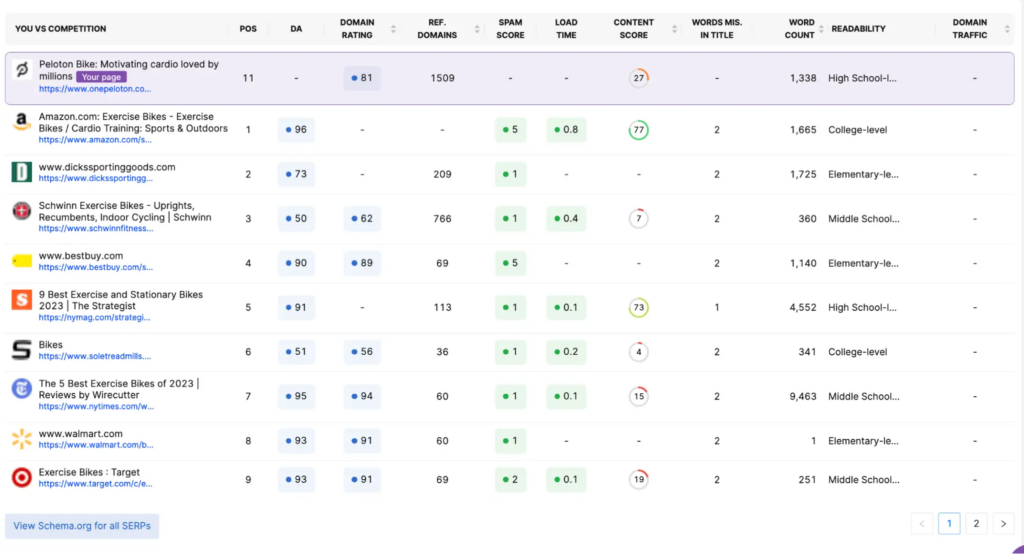
But that’s not all. The Backlink Analyzer and Site Explorer give you a deep dive into your competitors’ link profiles, with data from 100 trillion backlinks and 500 million domains.
At the same time, you get to see your competitors’ PPC spend and ad copy, as well as compare your content to theirs against a unique set of metrics.
OTTO SEO

One of their flagship tools is the AI SEO agent, OTTO, which handles all your SEO tasks automatically. This tool can save you hours of manual work, as it not only identifies issues, but also makes updates to your website directly.
The tool is getting another exciting addition soon, called the OTTO Google Ads, which will do the same for your PPC campaigns, saving you time and money.
Outreach Tools
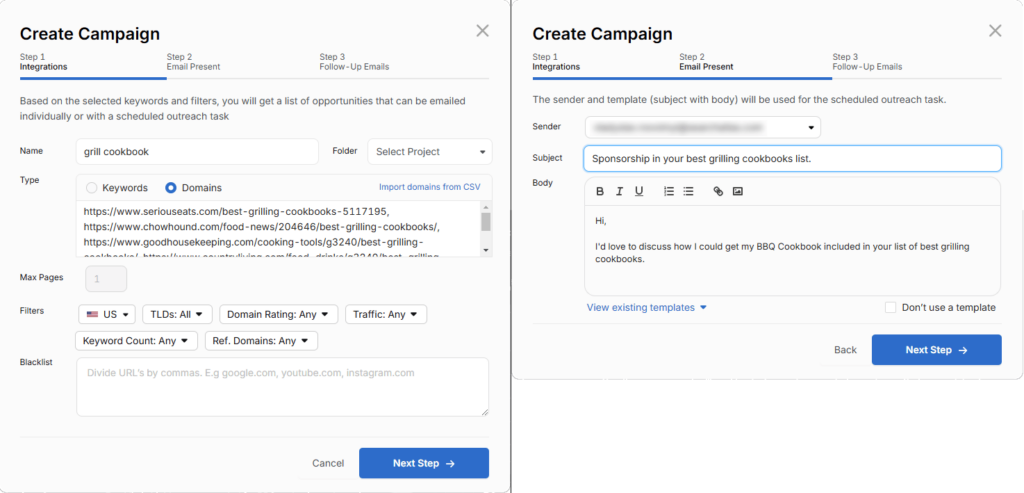
Search Atlas takes the hassle out of outreach with smart automation and easy-to-use tools. Instead of spending hours on repetitive tasks, you can streamline your workflow and focus on what moves the needle.
Craft personalized email pitches with customizable templates, fine-tune your campaigns, and save your best-performing messages for future wins. Plus, finding contact details for top publishers, bloggers, and influencers in your niche is a breeze—all from one convenient dashboard.
PPC Tools
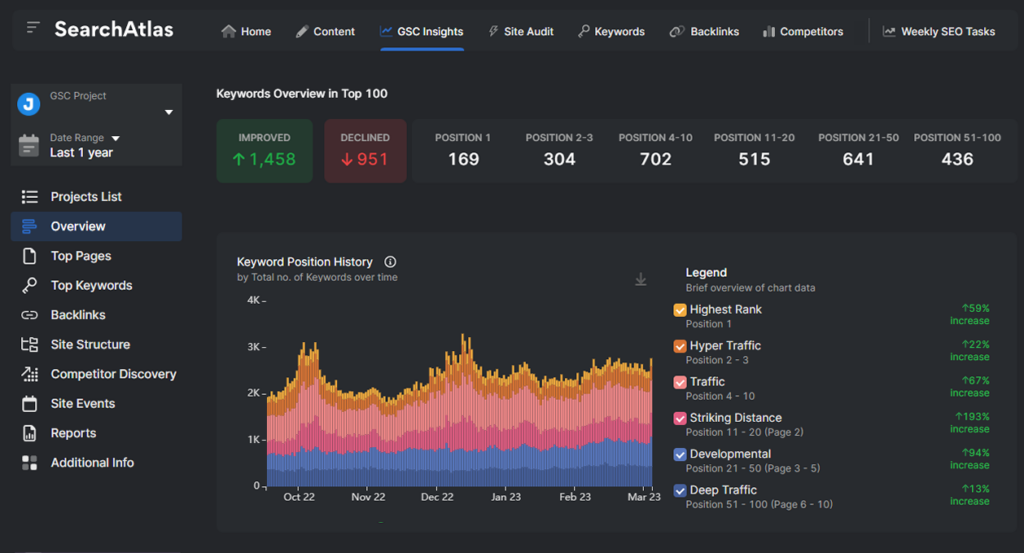
Search Atlas takes the stress out of PPC management with smart, easy-to-use tools that give you a real competitive edge.
With the PPC Comparison feature, you can see exactly how your spending and bidding strategies stack up against top competitors—making it easier to refine your campaigns for better results.
And if you need new, top-performing ad copy, the AI Ad Copy Creation tool has you covered. It generates engaging, results-driven ads that boost your Quality Scores and drive more engagement, all with minimal effort.
Content Tools
The SEO Content Assistant is a total game-changer. It helps you research, write, and edit with AI (like ChatGPT or Claude), generate images, analyze competitors, and even publish content to your site in just one click.
Need help with strategy? The Content Planner simplifies the process by organizing keyword clusters and search volumes, while Topical Maps give you a clear, visual way to see how all your content ideas fit together.
Another tool they’re really proud of is Search Atlas Scholar. This semantic grader analyzes your content in detail and shows you where you can improve compared to your competitors.
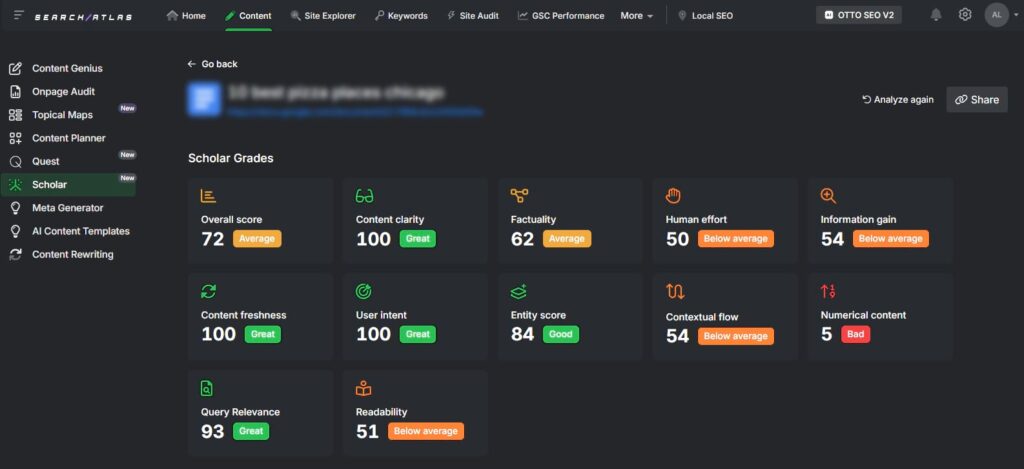
Usability
Comprehensive SEO tools can be tricky to navigate, as they offer a ton of information. In response, Search Atlas created a demo and onboarding process that lets you master all their tools with one-on-one help.
According to Gartner, Search Atlas is the top-ranked SEO platform for usability and user satisfaction.
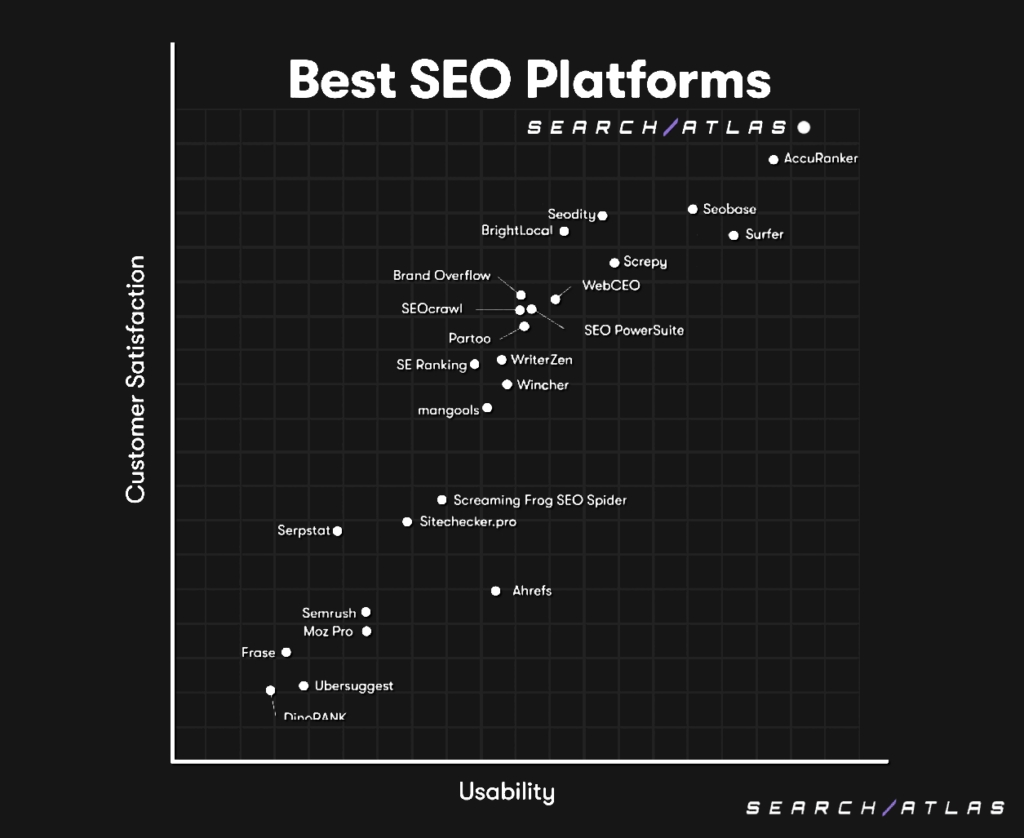
Search Atlas Pricing
Search Atlas gives you a full suite of powerful tools at a more budget-friendly price than Ahrefs and Moz. This includes OTTO activations, which are in themselves worth the cost, as they automate several days of work.
| Starter plan | Growth plan | Pro plan | Enterprise | |
|---|---|---|---|---|
| Price: | $99 monthly | $199 monthly | $399 monthly | Custom |
| Free OTTO Activation | 1 | 1 | 3 | Custom |
| User Seats | 2 | 3 | 5 | Custom |
| GSC Sites | 5 | 15 | Unlimited | Custom |
| Automated GBP Accounts | 3 | 10 | 25 | Custom |
| Regular AI Quota | 100 | 250 | Unlimited | Custom |
Save Money and Get Cutting-Edge AI Tools With Search Atlas
Looking for an SEO tool that covers all bases? Search Atlas offers robust features in keyword research, competitor analysis, backlink monitoring, and more. Powered by AI tools like OTTO, it helps you save time, optimize efforts, and achieve results quickly, all while remaining cost-effective.
Take advantage of a risk-free trial and experience the difference it can make for your business today. 🚀 Start your free trial now!


